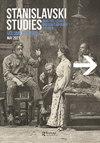“Staying on task — how the concept of skill-challenge balance provides a key element to the teaching of the Meisner technique”
IF 0.1
0 THEATER
引用次数: 0
Abstract
ABSTRACT This article presents how the concept of skill-challenge balance — derived from Csíkszentmihályi’s theory of Flow — can provide a key factor in the delivery and teaching of the Meisner technique as well as other actor training methods. The American acting practitioner Sanford Meisner’s foundational actor training focuses on the redirection of attention, to keep the actor present and less self-conscious. His exercises are presented in a way that encourages external attention to be sustained by using a logical step-by-step process and gradually increasing the difficulty – either when the students’ skills develop or when the exercise becomes automated. The article offers evidence that different attentional networks are activated depending on how much attention is directed to task, which rests on the challenge-skill balance being continually adjusted for the actor to sustain task-focus and avoid mind wandering. This demonstrates that finding the balance between skill and challenge in relation to task, while layering the exercises in an extended developmental training-process, is integral to the Meisner method. As an acting tutor, the concept of skill-challenge balance has greatly influenced my own practice, as well as solidified the importance of the teacher’s ability to acknowledge the student’s understanding and growth. By focusing on the individual and the personal aspect of the skill-challenge balance, highlights not only the importance of seeing this balance as something fluid – needing constant re-evaluation and adaptation – but also as a something that should be adhered to in any forms of vocational teaching and development. .“坚持任务——技能挑战平衡的概念如何为迈斯纳技巧的教学提供关键要素”
本文介绍了技能挑战平衡的概念-源自Csíkszentmihályi的心流理论-如何在迈斯纳技巧的传授和教学以及其他演员训练方法中提供关键因素。美国表演实践者桑福德·迈斯纳(Sanford Meisner)的基础演员训练侧重于注意力的重新定向,使演员保持在场,减少自我意识。他的练习以一种鼓励外部注意力的方式呈现,通过使用合乎逻辑的循序渐进的过程,并逐渐增加难度——要么当学生的技能发展,要么当练习变得自动化。这篇文章提供的证据表明,不同的注意力网络被激活取决于对任务的关注程度,这取决于演员不断调整挑战-技能平衡,以维持任务集中和避免走神。这表明,在与任务相关的技能和挑战之间找到平衡,同时在扩展的发展训练过程中分层练习,是迈斯纳方法的组成部分。作为一名表演导师,技能挑战平衡的理念极大地影响了我自己的实践,也巩固了教师承认学生理解和成长的能力的重要性。通过关注个人和个人方面的技能挑战平衡,不仅强调了将这种平衡视为一种流动的东西的重要性——需要不断地重新评估和适应——而且还强调了在任何形式的职业教学和发展中都应该坚持的东西。
本文章由计算机程序翻译,如有差异,请以英文原文为准。
求助全文
约1分钟内获得全文
求助全文

 求助内容:
求助内容: 应助结果提醒方式:
应助结果提醒方式:


